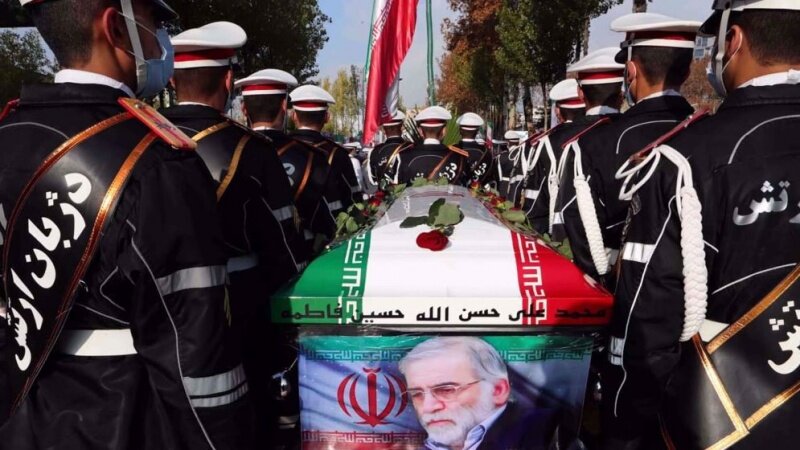Hawzah News Agency - He was buried at Imamzadeh Saleh mosque in Tajrish in northern Tehran's Shemiran district on Monday after a detailed funeral ceremony was held in the morning.
The cortege began at the Ministry of Defense in east Tehran, with top state and military officials on hand to pay their respect to a man who played a leading role in bolstering Iran's defense power and advancing its nuclear energy program.
An honor guard carried the casket containing his remains which reportedly received three shots during an ambush in a boulevard in Absard where an explosives-laden Nissan truck was blown up as the scientist and his security detail came under attack in a hail of bullets.
The remains of the weapon used in the assassination show that it was made in Israel. weapon collected from the site of the terrorist act bears the logo and specifications of the Israeli military industry.
Iran's Ministry of Intelligence also said it had obtained "new leads" on the identity of the perpetrators and that the information "will be publicized very soon."
At an outdoor portion of the Defense Ministry, the Islamic Revolution Guards Corps (IRGC) chief Gen. Hossein Salami, the IRGC's Quds Force head Gen. Esmail Qa'ani, head of the Atomic Energy Organization of Iran Ali Akbar Sahei and Intelligence Minister Mamoud Alavi sat apart from each other and wore masks due to the coronavirus pandemic as a reciter read several verses from the holy Qur'an.
A message was read out to the ceremony from Leader of the Islamic Revolution Ayatollah Seyyed Ali Khamenei, who has ordered officials to identify and punish the perpetrators of the crime and continue his scientific path with diligence.
Defense Minister Gen. Amir Hatami put his forehead against the casket and kissed it before addressing the ceremony, pledging that the assassination would make Iranians “more united, more determined.”
“For the continuation of your path, we will continue with more speed and more power,” Hatami said.
Hatami also called the nuclear arsenal of the US and the stockpile of atomic bombs Israel which is widely believed to possess at least 200 warheads “the most dangerous threat against humanity.”
The defense chief vowed that “no crime, assassination or act of folly will remain unanswered on the part of the Iranian nation."
“We will certainly pursue the criminals to the bitter end. They should know that they will meet their comeuppance and the Commander-in-Chief’s imperative will be implemented,” he added, referring to the Leader’s order for punishment of the perpetrators.
Hatami said despite carrying out the assassination to further their gains, the enemies ended up suffering defeat in three areas by perpetrating the atrocity.
First, Fakhrizadeh’s assassination introduced the scientist to the world as a “great model for those setting their foot on the path of struggle.” For those, he noted, Fakhrizadeh now serves as a model for scientific endeavor, assiduity, and purity of purpose.
Secondly, the assassination acted to turn the enemies into “the most hateful” in the eyes of the Iranian people.
And thirdly, the incident only managed to improve the country’s resolve to realize its purposes and enhance its integrity. As a case in point, he cited a recent decision to double the budget allocated to the innovation center within the Defense Ministry, which Fakhrizadeh used to direct.
Hatami also reminded that the enemies had resorted to assassinating the scientist after not being able to muster the courage to conduct military action against the Islamic Republic during the four decades after the Islamic Revolution.
On Sunday, Fakhrizadeh’s body was flown to the holy city of Mashhad, where it was taken inside the holy shrine of Imam Reza (AS), the eighth infallible imam of Shia Muslims.


Your Comment